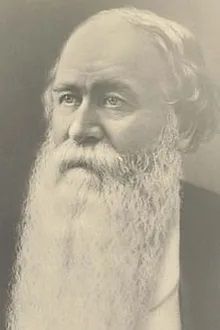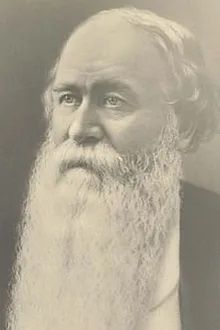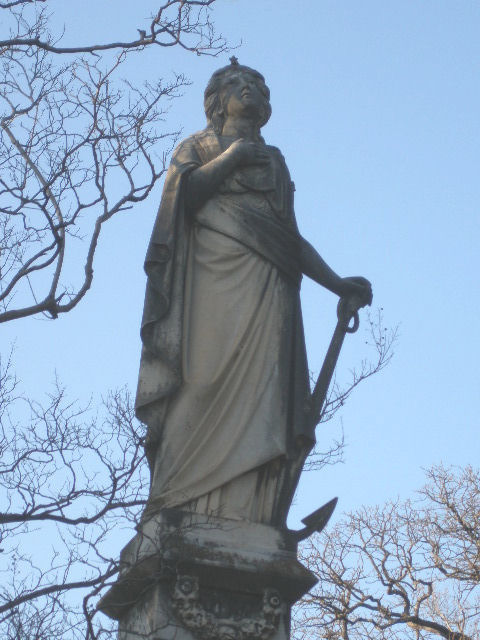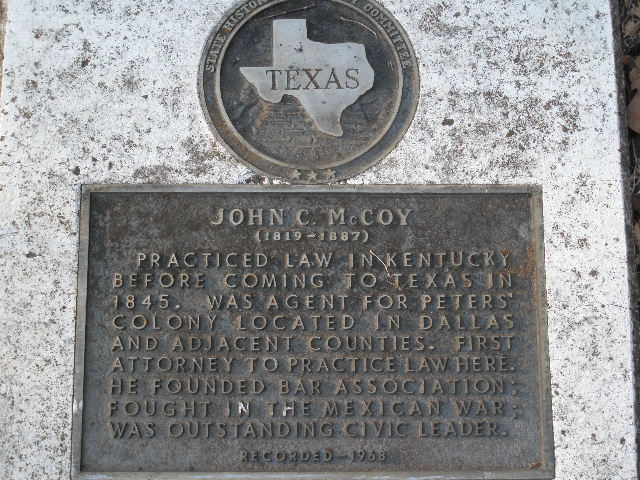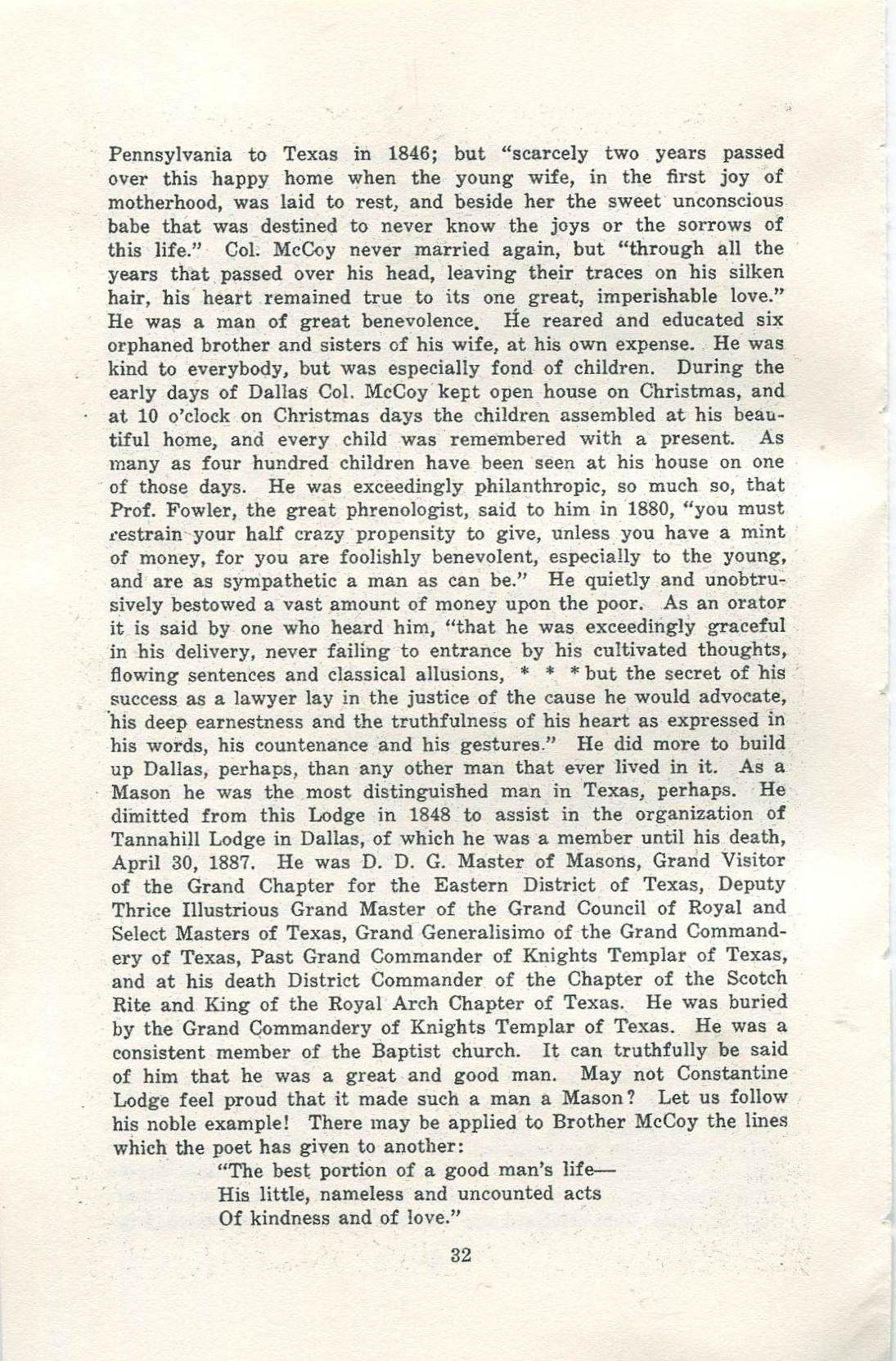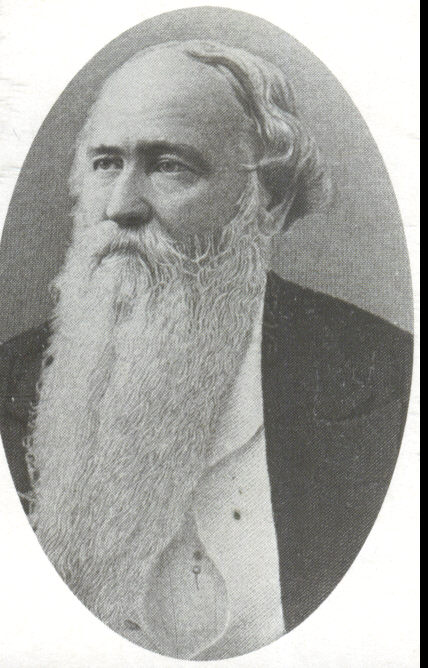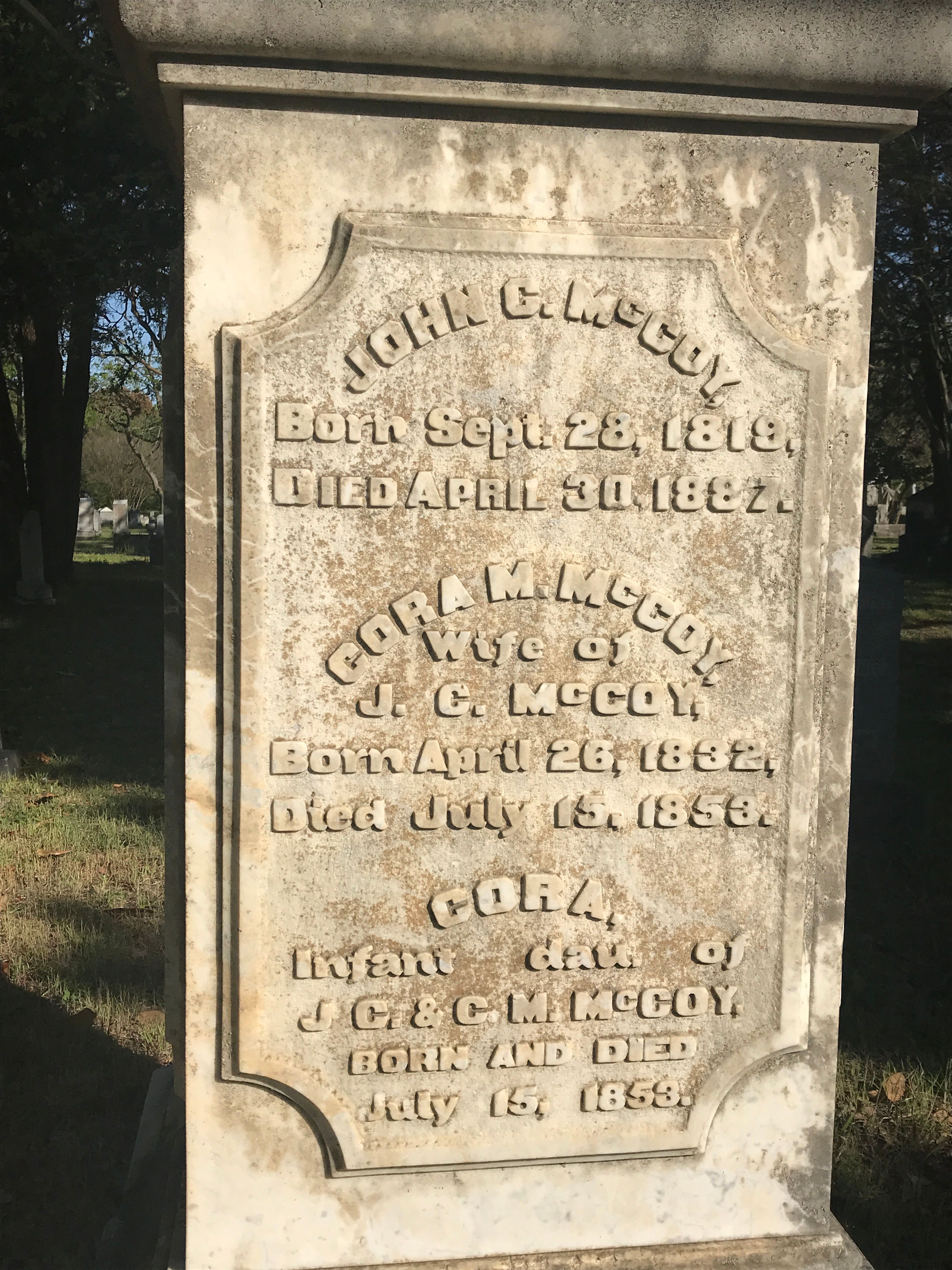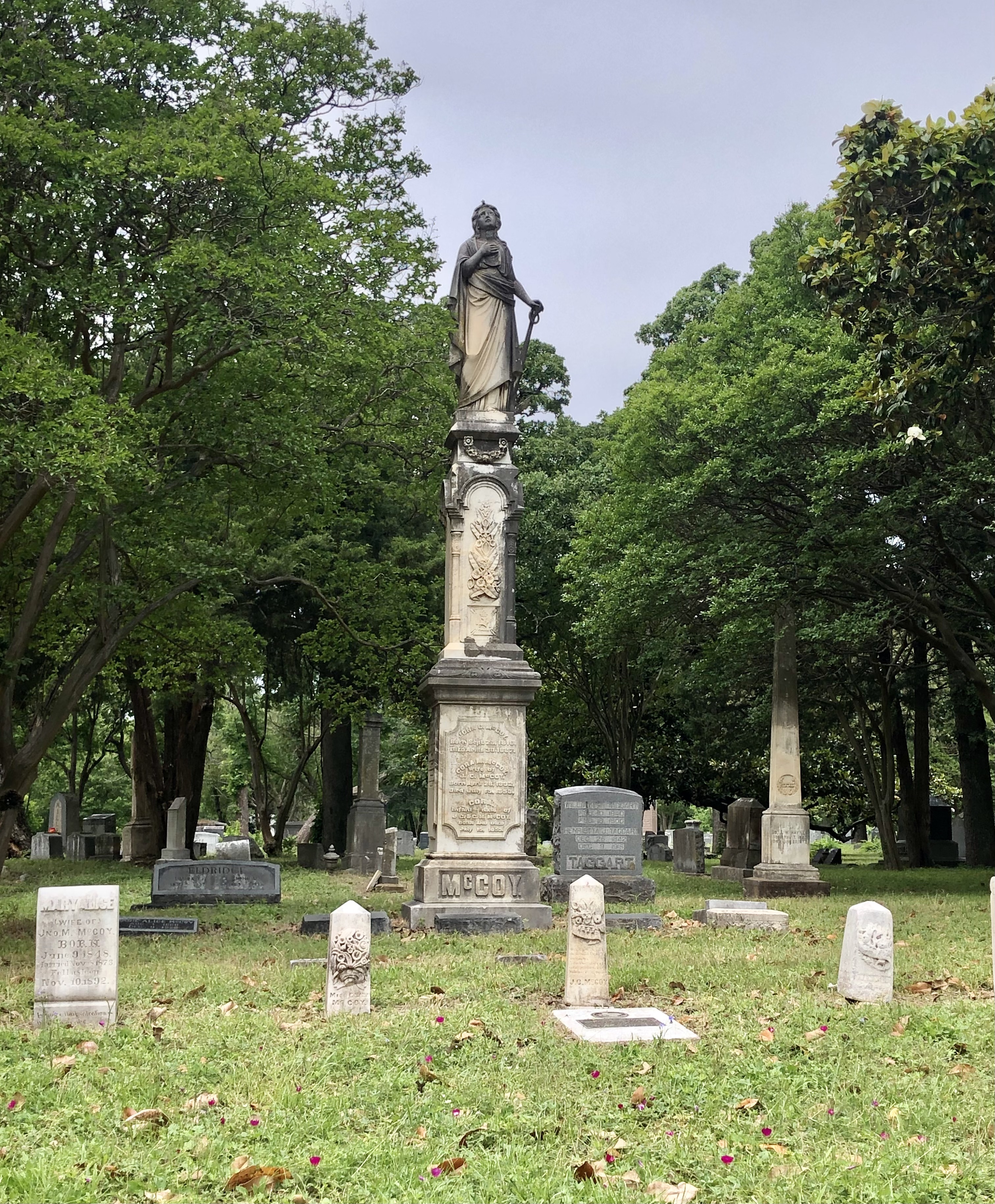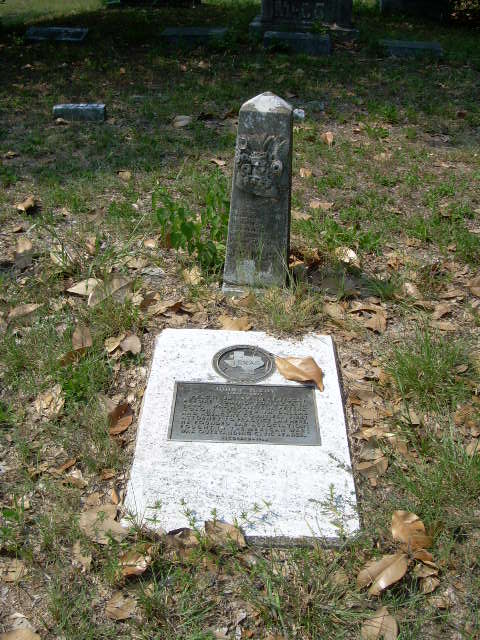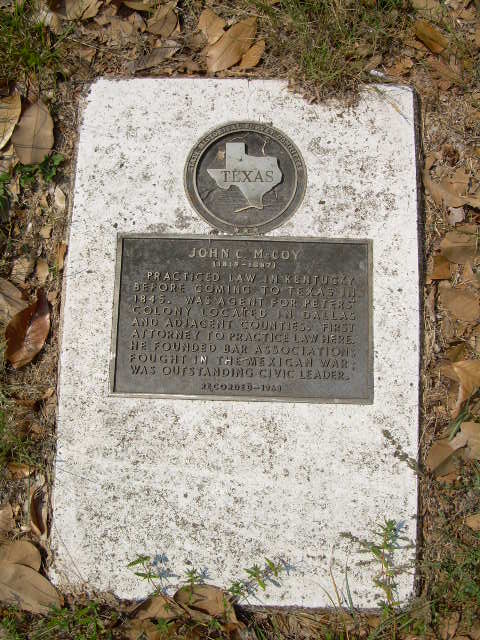In 1851 McCoy married Cora M. McDermott, the daughter of J.H. McDermott. He built the first framed home in Dallas on the west side of the public square where he lived until the death of his wife who died in childbirth in 1853. He never married again. He then moved to the corner of Harwood and Main Street. It is said that after the death of his wife and child he walked alone in the shadow of his sorrow until his own death. Not having a family of his own he contributed to the raising of others, including the orphan children of his sister. It is said that children of all races were seen playing around his house.
Colonel McCoy showed his strongest characteristics in his love for little children, and they in turn reciprocated all his regard in signs of affection for him. In this community no man enjoyed so much esteem among the juvenile element as he; and even the humblest approached him with confidence, knowing that he would not allow them to sustain any want that he could either gratify or supply. Christmas day never failed to find him prepared for the visits of his little friends, and Uncle Mac's Christmas tree, from the force of custom had grown into one of the established institutions of the city. His invitations were given through the newspapers. No better nor higher eulogium can ever be pronounced upon his character than the simple, single sentence, "He was the children's friend."
In 1856 he was elected district attorney of the Sixteenth Judicial District, a position he held for nearly three years. During the early months of the Civil War he was assigned to duty as mustering officer for the Confederate regiments raised by Nathaniel M. Burford and Trezevant C. Hawpe. Afterward he served as provost marshal for Dallas County. In 1862 he was elected to represent Dallas County in the Texas House of Representatives. He was reelected in 1864 and served until the Hamilton government was inaugurated under presidential Reconstruction. After the war McCoy remained active in Democratic Party politics and was highly regarded as a speaker, although he was never again a candidate for elective office.
In 1848, Colonel McCoy was made a Mason, at Bonham, Texas, in Constantine Lodge, and during the same year assisted in the organization of Tannehill Lodge, in Dallas. He was duly consecrated High Priest by the Council Order of Houston, June 13, 1861. At various times he was D. D. G. Master of Masons in Texas, Grand Visitor of the Grand Chapter for the Eastern District of Texas, Deputy Thrice Illustrious Grand Master of the Grand Council of Royal and Select Masters of Texas, Grand Generalissimo of the Grand Commandery of Texas. He was also Past Grand Commander of the Grand Commandery Knights Templar of Texas, and at his death was District Commander of the Scottish Rites, and King of the Royal Arch Chapter of Texas.
When he died on April 30, 1887 he lay instate for four days at his home. It is said that hundreds of people of all races came through to pay their respects and no one left with a dry eye. The funeral procession was witnessed by thousands. He is buried in The Tannehill Masonic Cemetery.
Courtesy Memorial and Biographical History of Dallas County Texas, The Handbook of Texas and Tannehill Lodge Number 52. Dallas Gateway: Pioneers of Dallas County
In 1851 McCoy married Cora M. McDermott, the daughter of J.H. McDermott. He built the first framed home in Dallas on the west side of the public square where he lived until the death of his wife who died in childbirth in 1853. He never married again. He then moved to the corner of Harwood and Main Street. It is said that after the death of his wife and child he walked alone in the shadow of his sorrow until his own death. Not having a family of his own he contributed to the raising of others, including the orphan children of his sister. It is said that children of all races were seen playing around his house.
Colonel McCoy showed his strongest characteristics in his love for little children, and they in turn reciprocated all his regard in signs of affection for him. In this community no man enjoyed so much esteem among the juvenile element as he; and even the humblest approached him with confidence, knowing that he would not allow them to sustain any want that he could either gratify or supply. Christmas day never failed to find him prepared for the visits of his little friends, and Uncle Mac's Christmas tree, from the force of custom had grown into one of the established institutions of the city. His invitations were given through the newspapers. No better nor higher eulogium can ever be pronounced upon his character than the simple, single sentence, "He was the children's friend."
In 1856 he was elected district attorney of the Sixteenth Judicial District, a position he held for nearly three years. During the early months of the Civil War he was assigned to duty as mustering officer for the Confederate regiments raised by Nathaniel M. Burford and Trezevant C. Hawpe. Afterward he served as provost marshal for Dallas County. In 1862 he was elected to represent Dallas County in the Texas House of Representatives. He was reelected in 1864 and served until the Hamilton government was inaugurated under presidential Reconstruction. After the war McCoy remained active in Democratic Party politics and was highly regarded as a speaker, although he was never again a candidate for elective office.
In 1848, Colonel McCoy was made a Mason, at Bonham, Texas, in Constantine Lodge, and during the same year assisted in the organization of Tannehill Lodge, in Dallas. He was duly consecrated High Priest by the Council Order of Houston, June 13, 1861. At various times he was D. D. G. Master of Masons in Texas, Grand Visitor of the Grand Chapter for the Eastern District of Texas, Deputy Thrice Illustrious Grand Master of the Grand Council of Royal and Select Masters of Texas, Grand Generalissimo of the Grand Commandery of Texas. He was also Past Grand Commander of the Grand Commandery Knights Templar of Texas, and at his death was District Commander of the Scottish Rites, and King of the Royal Arch Chapter of Texas.
When he died on April 30, 1887 he lay instate for four days at his home. It is said that hundreds of people of all races came through to pay their respects and no one left with a dry eye. The funeral procession was witnessed by thousands. He is buried in The Tannehill Masonic Cemetery.
Courtesy Memorial and Biographical History of Dallas County Texas, The Handbook of Texas and Tannehill Lodge Number 52. Dallas Gateway: Pioneers of Dallas County
Inscription
Texas Historical plaque
Family Members
Advertisement
Records on Ancestry
Sponsored by Ancestry
Advertisement
